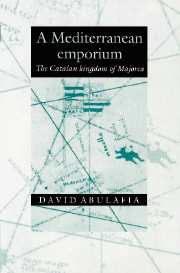Book contents
- Frontmatter
- Contents
- Preface
- Note on nomenclature
- List of the kings of Majorca, 1229–1343
- Note on the coinage of the kingdom of Majorca
- Map 1 The kingdom of Majorca
- Map 2 The western Mediterranean
- PART I UNITY AND DIVERSITY
- PART II THE CROSSROADS OF THE MEDITERRANEAN
- 6 The rise of the trade of Mallorca City
- 7 Commerce in the age of the Vespers
- 8 Towards economic integration: the early fourteenth century
- 9 The trade of the autonomous kingdom in its last two decades
- 10 From the Mediterranean to the Atlantic
- 11 The reshaping of Mallorca's economy, 1343–1500
- Conclusion
- Appendices
- Bibliography
- Index
7 - Commerce in the age of the Vespers
Published online by Cambridge University Press: 05 October 2010
- Frontmatter
- Contents
- Preface
- Note on nomenclature
- List of the kings of Majorca, 1229–1343
- Note on the coinage of the kingdom of Majorca
- Map 1 The kingdom of Majorca
- Map 2 The western Mediterranean
- PART I UNITY AND DIVERSITY
- PART II THE CROSSROADS OF THE MEDITERRANEAN
- 6 The rise of the trade of Mallorca City
- 7 Commerce in the age of the Vespers
- 8 Towards economic integration: the early fourteenth century
- 9 The trade of the autonomous kingdom in its last two decades
- 10 From the Mediterranean to the Atlantic
- 11 The reshaping of Mallorca's economy, 1343–1500
- Conclusion
- Appendices
- Bibliography
- Index
Summary
The creation of the autonomous kingdom of Majorca strengthened several of the links so far examined; but it weakened others. In the early days of the independent kingdom, trade with Barcelona continued unimpeded. Thus in 1280 Maria, widow of the successful Barcelonese entrepreneur Pere de Malla, sent from Barcelona to Mallorca ten jars of oil, as well as fustians of various colours and silk, on the ship of Pons Calafat of Mallorca, expecting wax, a major African export, to be sent from the island in return. A century or so later, Mallorca functioned as a clearing-house for African wax. However, the War of the Vespers resulted in a distortion of the Balearic trade routes, since the alignment of the king of Majorca with France and the papacy made direct contact with Catalonia and Valencia dangerous; James II of Majorca was, indeed, to lose the Balearics as a result of his links to France, between 1285 and 1298. The effects of the crisis are visible already in a series of licences to leave the port of Ciutat de Mallorca dating from the winter of 1284. The Majorcan government insisted that each native merchant and sailor departing from the island should register his movements and promise to return by early summer; the growing conflict between France and Aragon brought the threat of an Aragonese invasion of the Balearics, as in fact occurred in 1285.
- Type
- Chapter
- Information
- A Mediterranean EmporiumThe Catalan Kingdom of Majorca, pp. 129 - 149Publisher: Cambridge University PressPrint publication year: 1994



